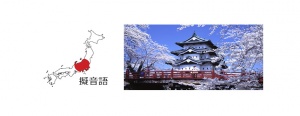Language/Japanese/Vocabulary/Unique-Expressions
In my last Japanese greetings lesson, I already told you a little bit about some of them. As we continue to explore the fascinating world of the Japanese language, today's lesson will focus on "Japanese Vocabulary → Unique Expressions." 🌟 After mastering these unique expressions, you might also be interested in learning about Japanese days of the week, Japanese food and drink vocabulary, and even Japanese film and theater terms to further expand your linguistic horizons. 🍱🎭 So, let's dive in and discover some truly unique Japanese expressions! 🚀
いただきます
"Itadakimasu" means "I will have this". It is used before eating any food to express appreciation and respect for life, nature, the person who prepared the food, the person who served the food, and everything else that is related to eating.
おつかれさま
"Otsukaresama" means "you're tired." It is used to let someone know that you recognize his/her hard work and that you are thankful for it.
木漏れ日
"Komorebi" refers to the sunlight that filters through the leaves of trees.
木枯らし
"Kogarashi" is the cold wind that lets us know of the arrival of winter.
物の哀れ
"Monoaware" is "the pathos of things." It is the awareness of the impermanence of all things and the gentle sadness and wistfulness at their passing.
森林浴
"Shinrinyoku" ("forest bathing") is to go deep into the woods where everything is silent and peaceful for a relaxation.
幽玄
"Yuugen" is an awareness of the universe that triggers emotional responses that are too mysterious and deep for words.
しょうがない
The literal meaning of "Shoganai" is “it cannot be helped.” However, it is not discouraging or despairing. It means to accept that something was out of your control. It encourages people to realize that it wasn’t their fault and to move on with no regret.
金継ぎ/金繕い
"Kintsukuroi" is the art of repairing pottery with gold or silver joining the pieces and understanding that the piece is more beautiful for having been broken.
わびさび
"Wabi-sabi" refers to a way of living that focuses on finding beauty within the imperfections of life and peacefully accepting the natural cycle of growth and decay.
IN ADDITION
One of the particularities of japanese language is the huge using of onomatopoeia. Japanese people like to illustrate things or actions by some sounds which describe them pretty well.
For example, there is a dish called shabu shabu.
This is an onomatopoeia refers to the sound of the slice of meat which is dived and stired in the sauc.
Onomatopeia kids song
Anime Ebichu
WARNING: this video contains explicit contents inside.
http://www.dailymotion.com/video/x4hrqrl_ebichu-hd-episode-19-english-subs_travel
Authors
Other Lessons

